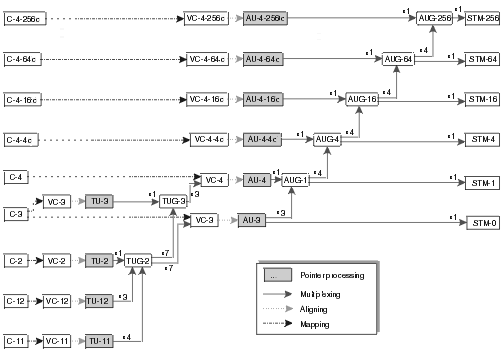SDH digital multiplexing
Digital multiplexing is SDH’s method of byte mapping tributary signals to a higher signal rate, which permits economical extraction of a single tributary signal without the need to demultiplex the entire STM-1 payload. In addition, SDH provides overhead channels for use by OAM&P groups.
SDH digital multiplexing
The following figure illustrates the SDH technique of mapping tributary signals into the STM frames.

Transporting SDH payloads
Tributary signals are mapped into a digital signal called a virtual container (VC). The VC is a structure designed for the transport and switching of STM payloads. There are various sizes of VCs: VC-11, VC-12, VC-2, VC-3, VC-4, VC-4-4c, VC-4-16c, VC-4-64c and VC-4-256c.
Table
The following table shows the mapping possibilities of some digital signals into SDH payloads.
|
Input tributary |
Voice Channels |
Rate |
Mapped Into |
|---|---|---|---|
|
1.5 Mbit/s |
24 |
1.544 Mbit/s |
VC-11 |
|
2 Mbit/s |
32 |
2.048 Mbit/s |
VC-12 |
|
6 Mbit/s |
96 |
6.312 Mbit/s |
VC-2 |
|
34 Mbit/s |
672 |
34.368 Mbit/s |
VC-3 |
|
45 Mbit/s |
672 |
44.736 Mbit/s |
VC-3 |
|
140 Mbit/s |
2016 |
139.264 Mbit/s |
VC-4 |
Alcatel-Lucent – Proprietary
Use pursuant to applicable agreements